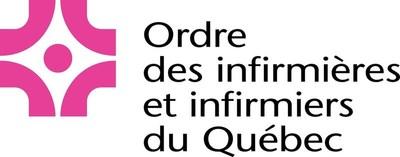Nursing workforce up 1.9% in 2020-2021
Improving services to citizens requires more efficient organization of work, better clinical support and university training
MONTREAL, Nov. 1, 2021 /CNW Telbec/ - The Order of Nurses of Quebec (OIIQ) had 80,491 nurses registered on its Roll as of March 31, 2021. Of this number, 74,467 nurses practiced their profession in Quebec - an increase of 1.9% compared to the previous year. This growth rate, as well as the number of licenses issued (3,629), are higher than the average of the last ten years.
This table, however, does not include the 2,900 people who have been granted special permission to participate in efforts to combat the COVID-19 pandemic. In total, the OIIQ has issued more than 6,000 exercise rights to people who were not members in good standing on the Roll, to enable them to contribute to this effort since the start of the pandemic.
A closer look at the data reveals that some 62,933 nurses, about 1,000 more than last year, were working in the health care network as of March 31, 2021. However, the proportion of the workforce in the network was 84.5%, compared to 84.8% last year.
Three priorities"This statistical portrait, in addition to the situation observed in recent months within the health network, allows us to affirm that the improvement of services to citizens depends on the return and retention of nurses, but also through three priorities: more efficient organization of work, better clinical support and university training to meet the more complex needs of the population", explains Mr. Luc Mathieu, president of the OIIQ.
The shortage of nursing personnel in the health and social services network has focused the spotlight on issues related to the organization of work. The most recent report notably shows that more nurses are turning to the private sector to improve their working conditions. Thus, 2,761 nurses practiced their profession on behalf of a personnel placement agency, an increase of 19% compared to 2019-2020. Even if this number remains low in proportion to all the staff working in the network, it is nevertheless the largest increase in ten years.

Furthermore, although the number of specialized nurse practitioners (SNPs) has been steadily increasing for ten years, Quebec still lags significantly behind Canada as a whole. As of March 31, 2021, Quebec had 842 IPS, which represents 9.3 IPS per 100,000 inhabitants, compared to 18.4 in the rest of Canada. The 1000 IPS mark should be reached shortly. In Ontario, the average is 22.2 per 100,000 population. The IPS make it possible to meet the health needs of the population in the following specialties: primary care, adult care, neonatology, pediatric care and mental health.
Furthermore, according to this most recent statistical report, the OIIQ has only 35 clinical nurse specialists and clinical nurse specialists (CNS). However, this is clearly insufficient to meet the demand. Moreover, these specialists intervene only in the prevention and control of infections, whereas the needs extend to other areas of practice.
Inverted age pyramidThis 2020-2021 statistical report also shows that the age pyramid of members registered on the Roll of the OIIQ has been inverted. Whereas ten years ago the 45-54 year olds were at the top of the pyramid, today the 35-45 and 25-35 year old groups now dominate the picture. “The profession welcomes a lot of young nurses. But retirements have accentuated the need to supervise this succession. However, the number of nursing managers is at the same level as ten years ago,” notes Mr. Mathieu.
In the same vein, we also note that the labor market integration rate remains higher for young people with a bachelor's degree than those with a college diploma, i.e. 93.5 % versus 89.9%.
More than 100 SNPs in MontérégieAs of March 31, 2021, 8,560 nurses practiced in Montérégie, of which 1,199 (14%) are authorized to carry out prescription activities and 102 are SNPs . After Montreal, it is the only region with more than 100 IPS. The region's nursing workforce grew by 1.6%, a rate comparable to that of Quebec as a whole. One-third of nurses residing in Montérégie work in Montreal, where supraregional services are offered for all of western Quebec. As a result, the number of direct care nurses per 1,000 population remains well below the provincial average of 7.6, or 5.2.
In 2020-2021, 374 emerging nurses obtained employment in Montérégie. Among the latter, a quarter hold a baccalaureate, ie about fifty graduates of the initial baccalaureate and nearly 40 nurses from France, whose diploma is recognized as being equivalent to the baccalaureate in nursing sciences in Quebec. As for holders of a DEC, 58% continue their training at the baccalaureate.
About the Order of Nurses of QuebecThe OIIQ is the largest professional order in the field of health in Quebec. It is governed by the Nurses Act and the Professional Code. The OIIQ is also guided by its governance values of trust, benevolence, respect and fairness. It has more than 80,000 members and some 16,000 people in the process of admission to the profession. Its mission is to ensure the protection of the public by and with nurses, while ensuring the improvement of the health of Quebecers. The OIIQ also has the mandate to ensure the competence and integrity of nurses in Quebec and to contribute to the promotion of quality nursing practice.
For more information:
SOURCE Order of Nurses of Quebec
Information: and interviews: Louis Beauchamp, 438-993-8861, [email protected]
Related Links
http://www.oiiq.org
Eudaemonism: all about this philosophy of happiness
GO
How Danielle Collins became a champion again despite having endometriosis
GO
Seven cases of COVID-19 are added to the regional balance sheet of Gaspésie
GO
Effects of palm oil on health: what are the dangers?
GO